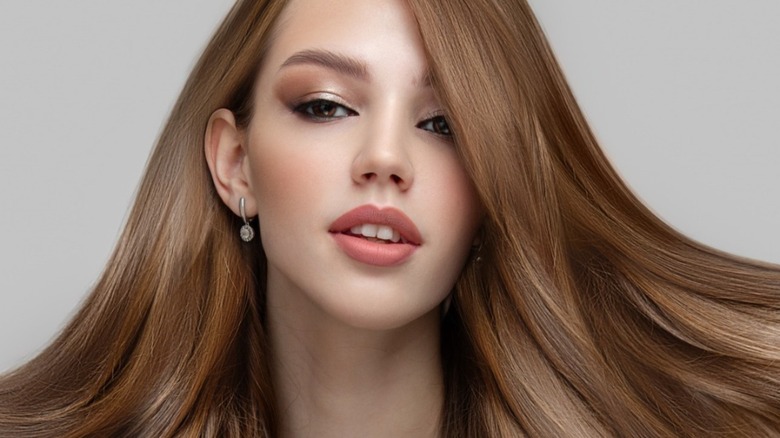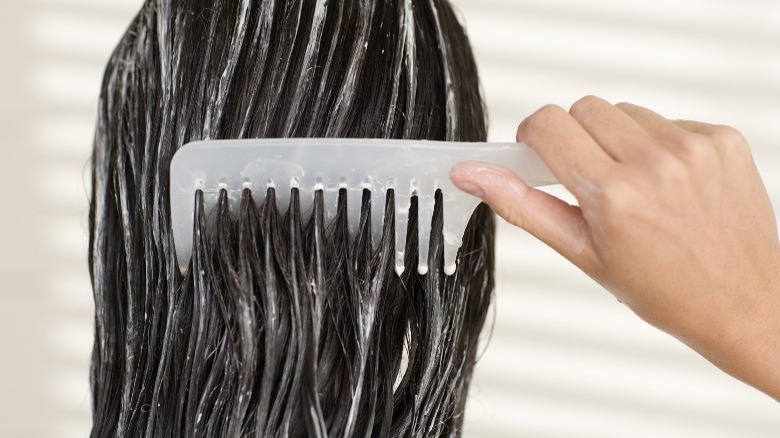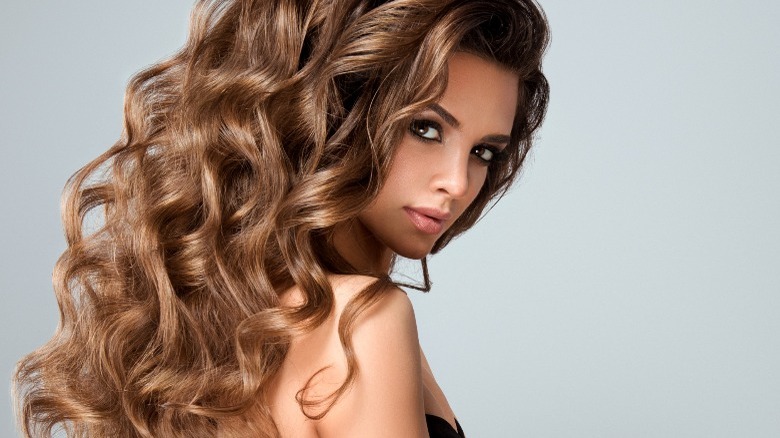Avoid This Kind Of Conditioner If You Have Thick Hair
We may receive a commission on purchases made from links.
Ever broken a scrunchie on the second twist trying to put your hair in a bun? Odds are, you have thick or dense hair (or flimsy scrunchies!) One way to tell if you really have thick or thin hair is to take a strand from the top of your head and roll it with your fingers to see if you feel it. And if you do, congratulations, your hair is thick. This is because thick hair is measured by the size of your strands, not how dense the hair is on your head, though both contribute to your hair care needs. As such, taking proper care of your thick hair can also come with its specificities.
When it comes to thick hair, the kind of conditioner you use can have an impact on the overall health of your strands, per Byrdie. Those with thick hair might notice that maintaining a supply of shampoo and conditioner can be a struggle; it seems to be all used up in a snap. And with so many marketing terms on the bottles, from "volumizing" to "fortifying" to "balancing" and more, it feels impossible to answer: what does thick hair really need from a conditioner, and what does it not need? We've broken down all of the conditioning needs for thick-haired readers below.
How conditioner works on your hair
First of all, it's important to understand what conditioner does for your hair. Shampoo is meant to cleanse your hair, clearing your scalp and strands of oil or dirt that has built up since your last wash, per Healthline. Conditioner seals your strands, protecting them from the elements and giving certain qualities to the hair depending on the kind you use. Conditioner moisturizes the hair by either coating the strands, or penetrating them with a moisturizing agent, per Chemists Corner. Some common examples of sealing ingredients include lipids, silicones, and emollients — which stay on the hair — while penetrating ingredients include humectants such as glycerin that draw water to the hair.
Thick hair tends to be coarser, and therefore more prone to split ends and tangles. As such, it is important to choose a conditioner that addresses these concerns, per Wow Skin Science. On the opposite end of the spectrum, products for fine hair tend to add volume to the hair by coating the strands with product, per Better Not Younger. These are the kinds of conditioners that those with thick hair need not use, as they can actually weigh down the hair instead of lift it up, like it does for those with fine hair.
Avoid anything 'volumizing'
Contrary to popular belief, you don't need to use a huge glob of conditioner to achieve beautifully moisturized locks. Instead, focusing on the proper ingredients for your hair will ensure that your hair gets what it needs, and you will not waste any excess. "Choosing a highly concentrated conditioner means you won't need gallons of product," hairstylist Mia Santiago of Sharon Dorram Color at Sally Hershberger told Allure. Santiago also says to "avoid any conditioners that say 'volume' on the bottle — they're not for the big-haired."
This cruelty-free conditioner from Ouai is made specifically for those with thick hair. For starters, it is free of sulfates SLS and SLES, parabens, formaldehydes, phthalates and more, each of which have been shown to have potentially adverse affects on your health. Instead, it's formed with moisturizing agent cetearyl alcohol, anti-static agents, shea butter — which penetrates the hair shaft — and more.
You could also consider which hairbrush is best for thick hair to complement the products you are using on your hair.


